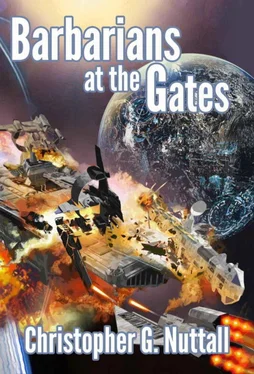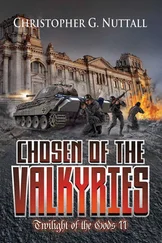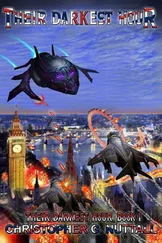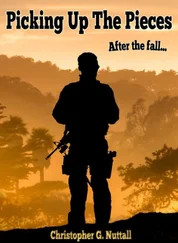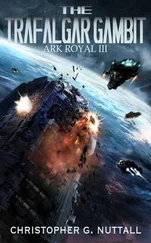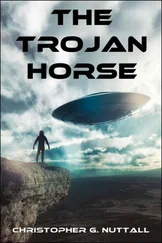The nine enemy battlecruisers didn’t seem to be heading for their current location; in fact, they were heading straight towards the Asimov Point. And the report from the passive sensor platforms was showing that their weapons and shields were fully charged. They were looking for trouble.
“I think we must have annoyed someone,” he said. “Alert the flag and prepare to move out of formation.”
The enemy battlecruisers didn’t slow until they reached the Asimov Point, at which point they came to a halt and waited. Roman wished—not for the first time—that the Federation Navy had developed the kind of sensors they saw in entertainment dramas, where it was possible to not only watch targets halfway across the system in real time, but determine what they were carrying and if they were hostile with ease. The enemy ships could be doing anything from sealing the Asimov Point to preparing to transit through with bad intentions; there was no way to tell at such a distance.
Admiral Mason’s face popped into existence on his private display. “Captain,” he said coldly. “I believe that your actions at Marx have sparked a response. I do not wish you to engage the enemy ships or even to scout after them.”
Roman frowned. “Sir, this is an opportunity to…”
“That is an order, captain,” Admiral Mason said. “In fact…”
“Captain, enemy starships are transiting the Asimov Point,” the sensor officer reported, suddenly. “They’re leaving the system.”
“It would appear that you succeeded,” Admiral Mason said. “We will keep our heads down and watch what happens from a distance. Might I remind you, captain, that you have already threatened the secrecy of this mission?”
“Yes, sir,” Roman said. It was frustrating, but Mason was in command. “I understand.”
* * *
Caitlin’s sense that something was very wrong only grew stronger as the fleet—still hidden under cloak—crossed the Tranter System, heading right towards the other Asimov Point. The system’s sole inhabited planet was barely defended, but there was a squadron of old-style dreadnaughts on guard at the Asimov Point. They could deter her from carrying through with her offensive—if she meant to take the system permanently—but they couldn’t stop her from launching an attack and then beating feet back home. Governor Hartkopf did not seem to have prepared for an attack.
“Start rolling missile pods,” she ordered as the squadron slowed to barely within engagement range. She wasn’t going to take battlecruisers any closer to the dreadnaughts than necessary, not with the dreadnaughts clearly refitted with the latest in weapons and shields—and sensors. Missile pods were rare in ship-to-ship combat, but attacking from cloak…they were workable. They just couldn’t be towed behind a ship travelling at full combat speed. “Prepare to engage.”
She pushed her misgivings away, knowing that she might well be about to open a two-front war between her superior and Hartkopf. The governor was a weasel, everyone knew that, yet he might just be able to bite Admiral Justinian to death. They didn’t dare pull too much combat power away from the Asimov Points linking Admiral Jefferson’s territory to the Federation. The Federation wouldn’t hesitate to take advantage of such weakness.
One by one, the battlecruisers checked in. “All ships report ready, Commodore,” the squadron coordinator reported. “Weapons hot; I say again, weapons hot.”
“Fire,” Caitlin ordered.
As the Federation considers itself to be charged with ensuring the fundamental unity of the human race, it comes as no surprise that it disapproves intensely of independent worlds. The few settlements that have no ties to the Federation often find themselves pressured into associate membership, even if they have nothing that the Federation actually wants or needs. When a world manages to maintain even a semblance of independence, it only occurs because the world is protected by powerful allies from the Federation.
-
An Irreverent Guide to the Federation , 4000 A.D.
Hobson’s Choice, 4095
“We’re not being challenged at all?” Captain Roman Garibaldi asked.
“No, sir,” Uzi said. The enhanced human looked as if he was enjoying himself. “Did you really think that they’d stop us coming into orbit? As far as they’re concerned, we’re just another pirate ship.”
Roman wrinkled his nose. The pirate ship—hastily renamed the Wildflower— stank. It was clear that the pirates hadn’t bothered to do much, if any, preventative maintenance. Roman knew that if Federation Navy ships had routinely been left in such a state, the entire Navy would literally have rotted away. His first commander would have exploded with rage if he’d discovered his crew urinating in the passageways and clogging up the tubes with rubbish, yet that’s exactly what the pirates appeared to have done. In the end, the repair crews had vented the entire ship, just to kill the cockroaches and rats infesting most of the ship. God alone knew how many pirate ships lost life support or internal power because a rat had chewed the wrong piece of wiring.
Even now, after the ship had been put back into near-working order, Roman was still nervous. Midway was following them into the system, hidden under cloak, but if Janine had to recover them, their cover would be blown wide open.
Hobson’s Choice had no government or System Traffic Command. Starships—smugglers, pirates and rebels—clustered the system, taking whatever orbits that suited them and ignoring protests from other starships. Roman would have expected a mass outburst of fighting among pirate crews, but everything seemed to be remarkably civilized. Fighting, the briefing files had stated, wasn’t good for business.
Hobson’s Choice served as a clearing house for pirates and smugglers, where anything could be sold and few—if any—questions were asked about where it had been originally found. The planet should have been shut down years ago, but it seemed that various interests in nearby sector governments had their own ties to the planet. They quietly ensured the Federation Navy never raided the place. Or, better yet, bombarded it from orbit.
He scowled as the helmsman—a volunteer, like everyone else on the undermanned ship—carefully guided her into orbit. Hobson’s Choice was a dull brown world, her surface unbroken by oceans or greenery. The briefing had claimed that most of the planet’s water was actually below the surface, with plants adapted to live in near-desert conditions growing roots that reached down towards the great aquifers. There were no official settlements, either; the handful of small communities were purely nominal, serving as places for crews to land and sell their products. Very few people would choose to live on the planet permanently, apart from Hobson himself. He’d built himself a small farm in the north and refused to have anything to do with most of the visitors.
“Orbit achieved, sir,” the helmsman said. The pirates, for reasons that doubtless made sense to them, had combined the helm and tactical consoles into one. Roman would never have allowed it if he’d been crewing a ship, for the two roles could not be effectively carried out by a single man. “We’ve been pinged by a number of other ships, but nothing from the surface.”
“They don’t bother,” Uzi said. He stood up and grinned at the bridge crew. “Do you still want to see the planet, captain?”
“Yes, I do,” Roman said.
The data they’d recovered from the pirate ship stated that the prisoners would have been brought to Hobson’s Choice, at least until the ransoms were paid. And if they weren’t, Elf had pointed out, they’d be in the right position for being sold as slaves. There were plenty of credible stories about that, or worse, people simply being executed outright; the lucky ones were rescued by the Federation Navy. “Besides, I have to make sure everything goes properly.”
Читать дальше
